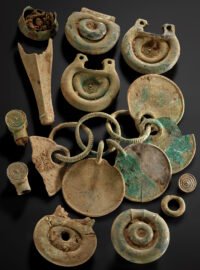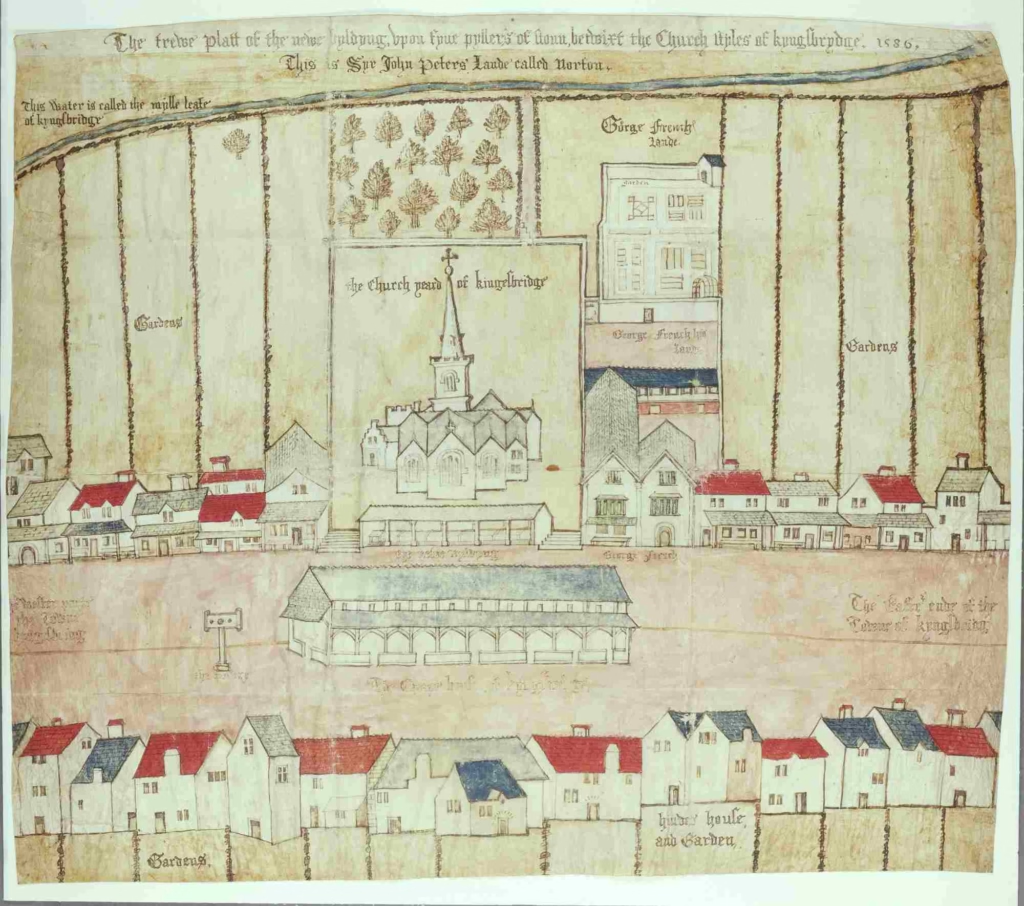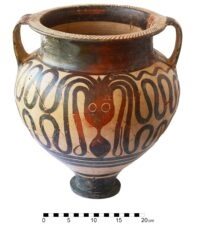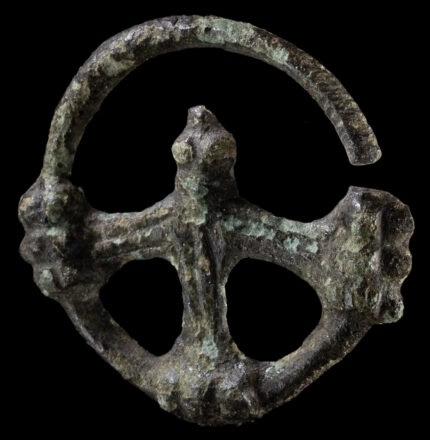National Museums of Scotland acquires unique Bronze Age treasure –

After four years of conservation and investigation, National Museums Scotland has acquired a unique collection of more than 500 bronzes dating from 1000-800 BC. The objects and materials in these hoards are individually rare, but the gathering of such diverse artifacts is unique in the European archaeological record.
 In 2020, metal detector expert Mariusz Stępień discovered the first bronzes near the town of Peebles on the Scottish Borders. Rather than excavating everything himself, he wisely reported the find immediately to the Scottish Treasures Department, and archaeologists from the National Museum of Scotland were sent to the Scottish Borders near the town of Peebles. investigation. They quickly realized that it was a treasure trove containing many objects, including organic elements, and decided to move the entire treasure to a clod of earth so that it could be excavated under laboratory conditions.
In 2020, metal detector expert Mariusz Stępień discovered the first bronzes near the town of Peebles on the Scottish Borders. Rather than excavating everything himself, he wisely reported the find immediately to the Scottish Treasures Department, and archaeologists from the National Museum of Scotland were sent to the Scottish Borders near the town of Peebles. investigation. They quickly realized that it was a treasure trove containing many objects, including organic elements, and decided to move the entire treasure to a clod of earth so that it could be excavated under laboratory conditions.
 Archaeologists performed CT scans of the discovered blocks so they could map the excavation in advance and record the internal structure of the treasure in its original condition. Archaeologists have discovered from scans that some of the pieces, including the first ones found at Stępień, were made using a lost-wax casting technique that is rare in Britain, suggesting they were made by highly skilled metalsmiths of. These are some of the earliest examples of lost wax cast items in Scotland.
Archaeologists performed CT scans of the discovered blocks so they could map the excavation in advance and record the internal structure of the treasure in its original condition. Archaeologists have discovered from scans that some of the pieces, including the first ones found at Stępień, were made using a lost-wax casting technique that is rare in Britain, suggesting they were made by highly skilled metalsmiths of. These are some of the earliest examples of lost wax cast items in Scotland.
 The meticulous laboratory excavation lasted five weeks and resulted in the discovery of more than 500 components, some of which were assembled with other items in the hoard. Some are intact, like a late Bronze Age sword still in its wooden scabbard.
The meticulous laboratory excavation lasted five weeks and resulted in the discovery of more than 500 components, some of which were assembled with other items in the hoard. Some are intact, like a late Bronze Age sword still in its wooden scabbard.
Other fragments are small, complex and fragile, often unable to survive underground for three thousand years. Many decorative bronze accessories remain attached to leather or wood. A series of bronze buttons still hang from 3,000-year-old ropes and straps. Astonishingly, the hoard also contains the rare remains of tiny bronze pins, studs and bosses embedded in wood or leather. Intricately decorated straps remain, most of which are still articulated. We don’t yet know what these straps are for. This is detail and insight not usually seen during the Bronze Age.

Some of the larger objects in the hoard highlight Bronze Age Scotland’s position as part of a network of North Sea communities. There are two rattle pendants, which are the first to be found in Scotland. These are more common in Denmark, northern Germany and northern Poland. Two other pieces from the UK were discovered in a hoard at Parc y Meirch in North Wales. These extraordinary objects are composed of interconnected bronze rings and hanging panels. They would be attached to a horse or wooden cart and would rattle when moved.

 Such a complex set of components is not assembled randomly. For the Bronze Age people who collected and buried the Peebles hoard, they were connected, both literally and metaphorically. Researchers will examine the connections between these artefacts and how they fit into the cultural context of Bronze Age Scotland and its links to mainland Europe.
Such a complex set of components is not assembled randomly. For the Bronze Age people who collected and buried the Peebles hoard, they were connected, both literally and metaphorically. Researchers will examine the connections between these artefacts and how they fit into the cultural context of Bronze Age Scotland and its links to mainland Europe.
 Conservation of bronzes and extremely fragile organic elements would be complex and expensive. National Museums Scotland will launch a public campaign to raise funds for the conservation and research of the Peebles Treasures. Currently, if you want to get involved, you have to contact their development team via email.
Conservation of bronzes and extremely fragile organic elements would be complex and expensive. National Museums Scotland will launch a public campaign to raise funds for the conservation and research of the Peebles Treasures. Currently, if you want to get involved, you have to contact their development team via email.
Watch Dr Matthew Knight, Senior Curator of Prehistory at National Museums of Scotland, explain the Peebles Hoard in this video. It gives you an idea of the scale of the object and the complexity of the excavation.


 Anal Beads
Anal Beads Anal Vibrators
Anal Vibrators Butt Plugs
Butt Plugs Prostate Massagers
Prostate Massagers
 Alien Dildos
Alien Dildos Realistic Dildos
Realistic Dildos
 Kegel Exercisers & Balls
Kegel Exercisers & Balls Classic Vibrating Eggs
Classic Vibrating Eggs Remote Vibrating Eggs
Remote Vibrating Eggs Vibrating Bullets
Vibrating Bullets
 Bullet Vibrators
Bullet Vibrators Classic Vibrators
Classic Vibrators Clitoral Vibrators
Clitoral Vibrators G-Spot Vibrators
G-Spot Vibrators Massage Wand Vibrators
Massage Wand Vibrators Rabbit Vibrators
Rabbit Vibrators Remote Vibrators
Remote Vibrators
 Pocket Stroker & Pussy Masturbators
Pocket Stroker & Pussy Masturbators Vibrating Masturbators
Vibrating Masturbators
 Cock Rings
Cock Rings Penis Pumps
Penis Pumps
 Wearable Vibrators
Wearable Vibrators Blindfolds, Masks & Gags
Blindfolds, Masks & Gags Bondage Kits
Bondage Kits Bondage Wear & Fetish Clothing
Bondage Wear & Fetish Clothing Restraints & Handcuffs
Restraints & Handcuffs Sex Swings
Sex Swings Ticklers, Paddles & Whips
Ticklers, Paddles & Whips






 Other fragments are small, complex and fragile, often unable to survive underground for three thousand years. Many decorative bronze accessories remain attached to leather or wood. A series of bronze buttons still hang from 3,000-year-old ropes and straps. Astonishingly, the hoard also contains the rare remains of tiny bronze pins, studs and bosses embedded in wood or leather. Intricately decorated straps remain, most of which are still articulated. We don’t yet know what these straps are for. This is detail and insight not usually seen during the Bronze Age.
Other fragments are small, complex and fragile, often unable to survive underground for three thousand years. Many decorative bronze accessories remain attached to leather or wood. A series of bronze buttons still hang from 3,000-year-old ropes and straps. Astonishingly, the hoard also contains the rare remains of tiny bronze pins, studs and bosses embedded in wood or leather. Intricately decorated straps remain, most of which are still articulated. We don’t yet know what these straps are for. This is detail and insight not usually seen during the Bronze Age.
 Some of the larger objects in the hoard highlight Bronze Age Scotland’s position as part of a network of North Sea communities. There are two rattle pendants, which are the first to be found in Scotland. These are more common in Denmark, northern Germany and northern Poland. Two other pieces from the UK were discovered in a hoard at Parc y Meirch in North Wales. These extraordinary objects are composed of interconnected bronze rings and hanging panels. They would be attached to a horse or wooden cart and would rattle when moved.
Some of the larger objects in the hoard highlight Bronze Age Scotland’s position as part of a network of North Sea communities. There are two rattle pendants, which are the first to be found in Scotland. These are more common in Denmark, northern Germany and northern Poland. Two other pieces from the UK were discovered in a hoard at Parc y Meirch in North Wales. These extraordinary objects are composed of interconnected bronze rings and hanging panels. They would be attached to a horse or wooden cart and would rattle when moved.











